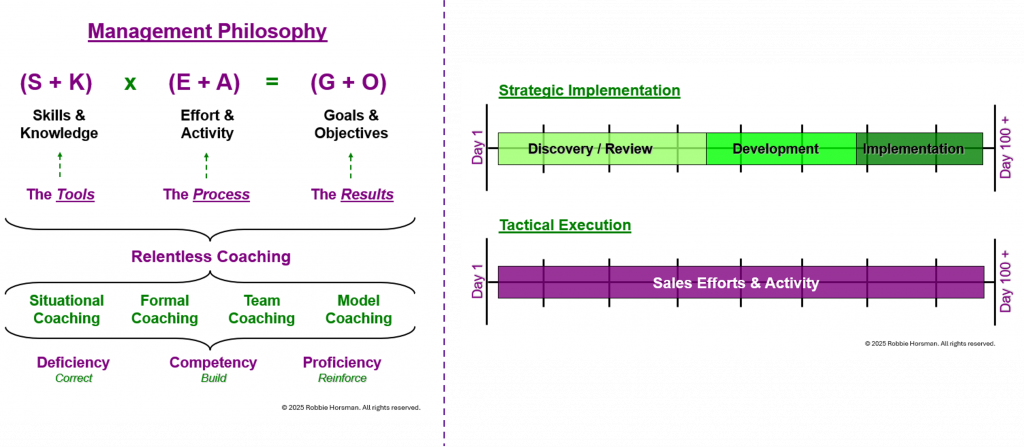A Leadership Lesson from the Front Lines of Sales Transformation
When I accepted a new leadership role within my company, I didn’t change employers, but it certainly felt like I had stepped into a whole new world.
This was a different business unit, a different team culture, and an entirely new set of expectations. For years, the division had been managed by two sales leaders overseeing a large, complex team. But the company made a bold decision: consolidate the leadership under a single executive. That executive was me. From day one, I knew this wasn’t just about managing a team, it was about leading a transformation. There were legacy processes in place, long standing behaviors, and a sales culture that had grown comfortable. My task was to respectfully challenge the status quo, build trust, and realign the organization around performance, accountability, and growth.
Bringing Philosophy to Life
Like many sales leaders, I’ve been through more sales training programs than I can count. Over time, I found myself drawn to one particular framework, simple, structured, and scalable. But I never followed it blindly. Instead, I adapted it into something uniquely my own, incorporating a coaching based leadership model that prioritizes clarity, ownership, and personal development.
When I stepped into this new role, I put that philosophy to the test, my first 100 days became the proving ground.
To keep the team focused and energized, I implemented a dual approach: one strategic, the other tactical. One set the direction; the other fueled the momentum.

Strategic Implementation: Setting the Foundation
The strategic side of the transformation was built around four deliberate phases, each designed to uncover truth, build alignment, and drive purposeful action.
- Discovery: My first job was to listen. Not just to what people were saying, but to what they weren’t. I met with team members at every level to understand what was working, what wasn’t, and what they wished they could change.
- Review: Next came evaluation. I took a critical look at our structure, our pipeline, our KPIs, and our customer engagement strategies. The goal wasn’t to critique, it was to identify opportunities for growth and scalability.
- Development: With insights in hand, we built the plan. Not a one size fits all solution, but a development path that reflected our unique challenges and untapped potential. I engaged the team in this process, ensuring shared ownership.
- Implementation: Then came execution. We aligned teams, clarified goals, and got to work, measuring success by outcomes, not activity. Everyone knew where we were headed and what was expected along the way.
Tactical Execution: Driving Daily Excellence
While strategy defined the destination, tactical execution was what moved the needle in real time. Here’s where we focused:
- Sales Effort: It’s not just about how much you do, it’s about how consistently and intentionally you do it. We celebrated discipline and persistence, even when the results weren’t immediate.
- Sales Activity: Every call, every email, every meeting, each interaction became part of a larger rhythm. We used data to refine our actions and focused on doing the right things, not just staying busy.
The Outcome
In just a few months, I saw something powerful begin to happen: the team started to believe in the new direction. Morale lifted. Communication sharpened. Wins increased. And perhaps most importantly, we began to reframe what “good” looked like, no longer just activity driven, but outcome driven, culture focused, and rooted in shared accountability.
Leadership is rarely about having all the answers. More often, it’s about asking the right questions, creating space for change, and inspiring belief in what’s possible.
Robbie

